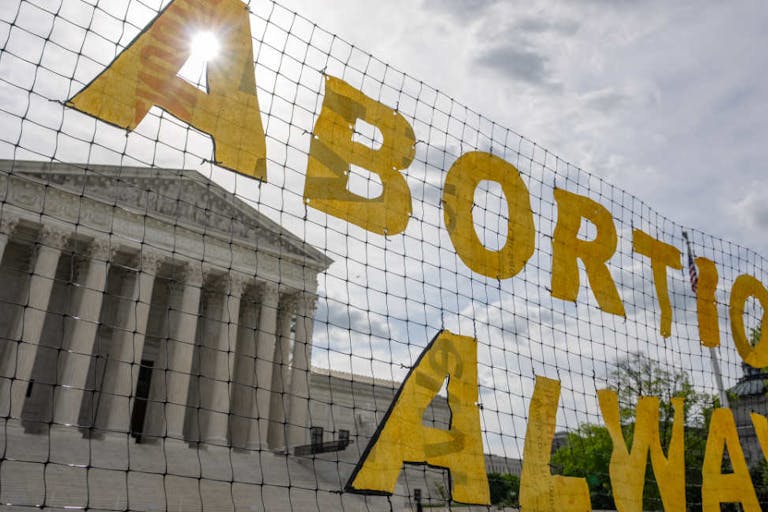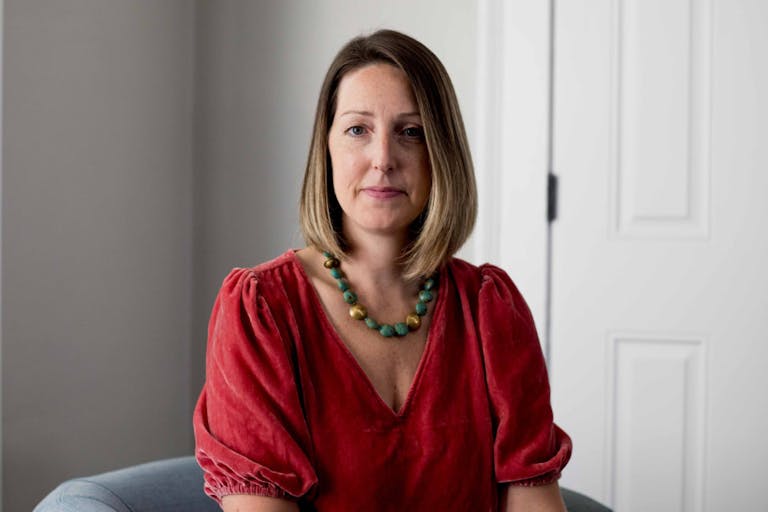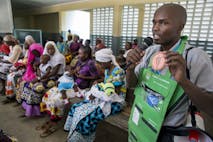
A growing number of Americans call themselves ‘pro-choice’ – but what’s really behind it?
Nancy Flanders
·
Abortionist who violated 10-year-old’s privacy makes bold claims
Last year, Indiana abortionist Caitlin Bernard made national headlines after telling the Indianapolis Star that she had committed an abortion on a 10-year-old girl who was a rape survivor. Questions and controversy immediately engulfed the story, and though Bernard did report the rape to authorities, she only did so after she spoke to the media.
Bernard soon came under investigation from Indiana authorities as well as her employer, Indiana University Health. Though her employer cleared Bernard of any violations, Indiana Attorney General Todd Rokita did not. Rokita continued his investigation, even as Bernard unsuccessfully attempted to sue him in retaliation. Ultimately, the state Medical Licensing Board found that Bernard had violated the young girl’s privacy by talking to the media about the abortion.
Now, in a new op-ed, Bernard makes a number of bold claims about how women are allegedly at risk from pro-life laws.
Was Bernard “gagged?”
Noting that Roe v. Wade was overturned one year ago, Bernard wrote that she and other abortionists watched in “fear” as pro-life laws were able to take effect across the country. Saying she was worried about the “real consequences” of these laws, Bernard ran to the media. “[A]lmost one year ago, I spoke about what I was witnessing to warn others, in the hope that I could prevent even one more person experiencing trauma. In response, I was personally attacked on national television by the very people elected to ‘protect’ us,” she wrote. “You might be wondering why I have been quiet for the last six months. It’s because I have been effectively gagged as I fight to keep my medical license and my ability to continue providing critical medical care in the Midwest.”

Bernard ignored that pro-life laws include exceptions for medical necessity in every single state. This includes Ohio, where the 10-year-old rape victim lives. Ohio Attorney General Dave Yost explained last year that she would have been able to undergo the abortion in Ohio under the state’s medical exemption (though induced abortion is never medically necessary).
Before committing the abortion, Bernard was already an abortion activist who frequently gave media interviews — so much so, that it led people to question the validity of her story. She reported the rape to the media the day before she reported it to the authorities as she was legally required to do. It quickly took off, though Bernard claimed in her report that the assailant was a minor — not an adult. Gerson Fuentes, the man arrested for the rape, is 27.
Far from being gagged, as she described her brief media silence, Bernard has continued speaking out — on Twitter, in op-eds, and in media interviews.
Do women need abortion?
Bernard made the oft-repeated claim that women need abortion and that not being able to have an abortion has led to medical crises across the country. “Almost every day we read a new story detailing the horrific experience a woman went through when she was denied access to essential health care. Women from states such as Missouri, Tennessee and Texas are being denied care for life-threatening pregnancy complications, including ectopic pregnancies,” she said. “Women were forced to wait until they almost died of infection, told to sleep in their car in the hospital parking lot so they’re close by in case they start hemorrhaging, forced to undergo risky surgery and traumatic deliveries, forced to travel thousands of miles – all while facing the increasing chance of complications with every additional hour.”
These stories are true, in the sense that women have faced serious complications and needed medical interventions. But the treatment needed was not induced abortion. The examples cited by Bernard are actually ones of medical malpractice and neglect, including one involving a woman who was sent across a state border for an abortion while in kidney failure by an abortionist, when what the woman needed was legitimate medical care.
An induced abortion, in which the preborn child is directly and intentionally killed, is never medically necessary. It is true that in some cases, such as eclampsia, a premature delivery may be necessary to save the mother’s life, and the child may not survive. But there is a difference between a life-saving procedure in which one of the two patients dies as a tragic result and a procedure that is carried out with the intention of causing death prior to delivery — sometimes by a D&E dismemberment abortion.
Article continues below
Dear Reader,
In 2026, Live Action is heading straight where the battle is fiercest: college campuses.
We have a bold initiative to establish 100 Live Action campus chapters within the next year, and your partnership will make it a success!
Your support today will help train and equip young leaders, bring Live Action’s educational content into academic environments, host on-campus events and debates, and empower students to challenge the pro-abortion status quo with truth and compassion.
Invest in pro-life grassroots outreach and cultural formation with your DOUBLED year-end gift!

What women need during medical emergencies are interventions such as a cerclage (a stitch placed in the woman’s cervix) to prevent preterm labor, antibiotics, or other standard medical treatments. Induced abortion is not the recommended treatment for any pregnancy complication. And as the American Association of Pro-Life Obstetricians and Gynecologists (AAPLOG) explained:
There are times when separating the mother and her unborn child is necessary to save the life of the mother, even if the unborn child is too premature to live. In those tragic cases, if possible the life of the baby will be attempted to be preserved, and if not possible, the body of the unborn child is treated with respect, recognizing the humanity of the life which is lost in the separation. In contrast, the purpose of an induced abortion is to produce a dead baby. The Centers for Disease Control and Prevention defined legal induced abortion as an “intervention performed by a licensed clinician (e.g., a physician, nurse-midwife, nurse practitioner, or physician assistant) that is intended to terminate a suspected or known ongoing intrauterine pregnancy and produce a non-viable fetus at any gestational age.”
That is what an abortionist is paid to do: to kill the unborn child before delivering it, or to kill the child during the delivery process, as is done with partial-birth abortion. So the focus of the abortion procedure is on killing the unborn child, and the purpose of the abortion is to produce a dead baby. Induced abortion, that is the deliberate killing of an unborn child prior to separating that child from the mother, is never necessary to save the life or preserve the health of any woman.
Bernard also claimed that pro-life laws are hurting women in another way. “When OB-GYNs leave, hospitals are forced to close their labor and delivery services, creating maternal care deserts and forcing pregnant women to travel for or forgo basic pregnancy care,” she said of abortionists leaving pro-life states, in favor of states with liberal abortion laws.
Of course, the real reasons for these hospital closures are issues such as budget cuts and low patient volume.
The real moral failure
Bernard bemoaned how doctors “like her,” presumably meaning abortionists, have to stand by and watch as patients are “denied basic health care,” by which she presumably means abortion. Legitimate medical care is not restricted anywhere in the country. Yet she claims this leads to an ethical quagmire for her and other doctors.
“This moral injury weighs heavily on me every day,” she said. “I am not the only physician who has faced backlash for advocating for patients and for access to health care. Make no mistake, the targeting of physicians who provide abortion care with both personal and professional violence and harassment is nothing new.”
As the FBI has pointed out, it is the pro-life movement — and not the abortion industry — that has suffered the majority of violence and harassment since Roe fell, though such attacks are frequently downplayed.
More important, however, is Bernard’s so-called “moral injury.” The majority of OB/GYNs do not commit abortions, and abortionists have likewise spoken about how they are not well-respected in the medical community.
Most doctors join the medical profession because they want to save lives. Abortionists take them, every single day, and that is the real “moral injury” Bernard should be grappling with. It’s no surprise, then, that so many abortionists and abortion facility staffers have spoken about having nightmares and other negative effects from participating in abortion. “Even now I feel a little peculiar about it,” abortionist Benjamin Kalish has previously said. “Because as a physician I was trained to conserve life, and here I am destroying it.”
Bernard portrays herself as a crusader for women and families, but the work she does — killing innocent human beings — hurts women. She wrote, “More important, I hope that our children will one day live in a country that truly supports women and their families.”
Yet, abortion is inherently misogynistic, allowing societal structures to remain in place that prevent women from being able to get an education or navigate a profession without feeling they have to choose between their career and their family. It allows the current status quo, in which women are punished for their fertility, to continue. Women, and their children, deserve better.
Live Action News is pro-life news and commentary from a pro-life perspective.
Contact editor@liveaction.org for questions, corrections, or if you are seeking permission to reprint any Live Action News content.
Guest Articles: To submit a guest article to Live Action News, email editor@liveaction.org with an attached Word document of 800-1000 words. Please also attach any photos relevant to your submission if applicable. If your submission is accepted for publication, you will be notified within three weeks. Guest articles are not compensated (see our Open License Agreement). Thank you for your interest in Live Action News!

Nancy Flanders
·
Analysis
Cassy Cooke
·
Analysis
Cassy Cooke
·
Analysis
Cassy Cooke
·
Analysis
Cassy Cooke
·
Analysis
Nancy Flanders
·
Analysis
Cassy Cooke
·
Analysis
Cassy Cooke
·
Analysis
Cassy Cooke
·
Analysis
Cassy Cooke
·
International
Cassy Cooke
·